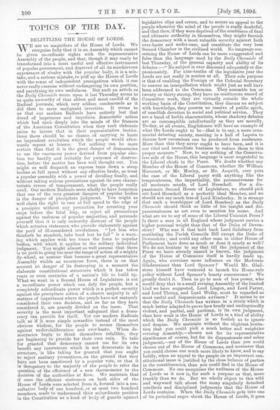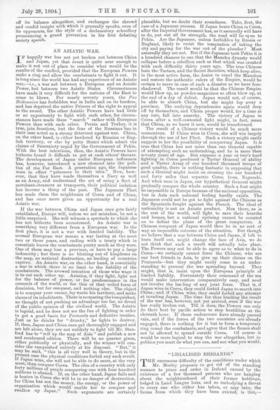TOPICS OF THE DAY.
BELITTLING THE HOUSE OF LORDS.
WE are no magnifiers of the House of Lords. We recognise fully that it is an Assembly which cannot be given co-ordinate rights with the representative Assembly of the people, and that, though it may easily be transformed into a most useful and effective instrument of popular government, and deprived of all its mischievous appearance of rivalry with the popular body, it is a mis- take, and a serious mistake, to puff up the House of Lords with the sense of independent prerogatives which it can never really exercise without endangering its own position, and paralysing its own usefulness. But such an article as the Daily Chronicle wrote upon it last Thursday seems to us quite unworthy of that ablest and most candid of the Radical journals, which very seldom condescends as it did then to mere malignant invective. It seems to us that our modern Radicals have entirely lost that dread of impetuous and impulsive democratic action which had sunk deeply into the minds of the framers of the American Constitution when they took elaborate pains to insure that in their representative institu- tions there should be no chance of carrying in haste an imprudent revolution which thepeople would after- wards repent at leisure. Yet nothing can be more certain than that it is the great danger of democracies to use the enormous power derived from popular elec- tion too hastily and irritably for purposes of destruc- tion. before the matter has been well thought out. You might as well despatch an express train down a steep incline at full speed without any effective brake, as trust a popular assembly with a power of deciding finally, and without taking serious precautions against its own charac- teristic errors of temperament, what the people really need. Our modern Radicals seem wholly to have forgotten that one of the very greatest dangers of popular bodies is the danger of precipitate judgment. You might as well claim the right to race at full speed to the edge of a precipice without any precaution for arresting your steps before the fatal leap, as reject all precautions against the rashness of popular majorities, and persuade yourself that it is only unworthy distrust of the people which actuates statesmen who provide elaborately against the peril of ill-considered revolutions. "Let him who thinketh he standeth, take heed lest he fall " is a warn- ing which applies with ten times the force to popular bodies, with which it applies to the solitary individual judgment. You might almost as well assume that there is no peril in going too near the range of action of a mighty fly-wheel, as assume that because a great representative Assembly wields an enormous force, there is on that account no danger of its destroying in a moment the elaborate constitutional structures which it has taken years or even centuries of a nation's life to build up. What we want in a Second House of Legislature is not a co-ordinate power which can defy the people, but a completely subordinate power which is a perfect security against the precipitate action of a chance majority in all matters of importance where the people have not maturely considered their own decision, and so far as they have considered it, are gravely divided on the issue. That security is the most important safeguard that a demo- cracy can provide for itself. Yet our modern Radicals talk as if it were simple cowardice instead of the most obvious wisdom, for the people to secure themselves against under-deliberation and over-baste. When de- mocracies begin to think themselves infallible, they are beginning to provide for their own ruin. To take for granted that democracy cannot use for its own benefit any instrument which is not democratic in its structure, is like taking for granted that you ought to reject sanitary precautions, on the ground that they have not been sanctioned by a popular vote, or that it is derogatory to the majority of the people to refer the question of the efficiency of a new thermometer to the decision of the authorities at Kew. We maintain that if once the efficient statesmen on both sides of the House of Lords were selected from it, formed into a con- sultative body of one hundred, or at most two hundred members, made to understand their subordinate position in the Constitution as a kind of body of guards against legislative slips and errors, and to secure an appeal to the people whenever the mind of the people is really doubtful, and that then, if they were deprived of the semblance of final and ultimate authority in themselves, they might furnish the democracy with a most valuable security against both over-baste and under-care, and constitute the very best Second Chamber in the civilised world. No language con- cerning the House of Lords can be more exaggerated and false than the language used by the Daily Chronicle of last Thursday, of the general capacity and ability of its debates :—" No subject is ever discussed adequately or dis- passionately. For nine-tenths of the legislative year the Lords are not really in session at all. Their sole purpose is that of enabling the Foreign or the Colonial Secretary to answer an interpellation which might just as well have been addressed to the Commons. They assemble ten or twenty or thirty strong, they have no continuous record of Committee work, they are virtually outside the whole working basis of the Constitution, they discuss no subject with knowledge, they possess no reserve of public spirit, of unselfish devotion to social and political service. They are a band of feeble obscurantists, whose shadowy debates are as contemptible intellectually as they are morally. To-day, at all events, Englishmen will have an example of what the Lords ought to be—that is to say, a mere orna- mental debating society, meeting in a ball of Laputa to discuss how cucumbers can be produced from sunbeams. More than this they never ought to have been, and it is our vital and immediate business to reduce them to this proper measure." Now, to say nothing of the Conserva- tive side of the House, this language is most ungrateful to the Liberal chiefs in the Peers. We doubt whether any Member of the House of Commons, whether Sir William Harcourt, or Mr. Morley, or Mr. Asquith, ever puts the case of the Liberal party with anything like the temperateness, the impartiality, the persuasiveness for all moderate minds, of Lord Herschell. For a dis- passionate Second House of Legislature, we should pick out Lord Herschell as a perfectly ideal Member, and we should not say much less of Lord Kimberley. It is strange that such a worshipper of Lord Rosebery as the Daily Chronicle should think so little of his insight and dis- passionateness as not even to mention his name. And what are we to say of some of the Liberal Unionist Peers ? Is there a man in all England whose judgment carries a higher personal weight than that of the Duke of Devon- shire ? Who was it that held back Lord Salisbury from mutilating the Parish Councils Bill except the Duke of Devonshire ; and could any other man in either House of Parliament have done as much or done it nearly so well? We do not hesitate to say that till the judgment of the Peers we have already named is known, the judgment of the House of Commons itself is hardly made up. Again, who exercises more influence on the Moderate Gladstonians than Lord Spencer ? Would Mr. Glad- stone himself have ventured to launch his Home-rule policy without Lord Spencer's hearty concurrence ? We greatly doubt it. Then to go to men of less power, who, would deny that in a small revising Assembly of the limited kind we have suggested, Lord Lingen, and Lord Farrer, and Lord Thring, and Lord Welby, must be regarded as most useful and dispassionate advisers ? It seems to us that the Daily Chronicle has written in a strain which is much better adapted to prove how heady and undisguisedly violent, and partial, and partisan, is its own judgment, than how weak is the House of Lords m a kind of ability which the Daily Chronicle is so foolish as to ignore and despise. We maintain without the slightest hesita- tion that you could pick a much better and weightier revising Assembly,—chosen not for its representative significance of course, but for its dispassionate and sober judgment, —out of the House of Lords than you could choose out of the House of Commons, and moreover that you could choose one much more likely to know, and to say boldly, when an appeal to the people on an important con- stitutional issue is justified by the close balance of parties in the constituencies, than you could find in the House of Commons. No one recognises the unfitness of the House of Lords as it now is, for such a purpose as that, more frankly than we do. But we wholly object to this wild and way ward talk about the many singularly detached intellects and disciplined judgments that the House of Lords contains. When the Daily Chronicle gets into one of its periodical rages about the House of Lords, it goes off its balance altogether, and exchanges the shrewd and candid insight with which it generally speaks, even of its opponents, for the style of a, declamatory schoolboy pronouncing a grand peroration in his first debating society speech.



































 Previous page
Previous page